Diplomatic Bluebook 2019
Chapter 3
Japan's Foreign Policy to Promote National and Global Interests
5 Japan's Efforts at the United Nations (UN)
(1) Japan-UN Relationship
The UN is an international organization with a universal character, in which almost all the countries in the world hold membership (193 countries as of December 2018). With a high level of expertise, it addresses various challenges that the international community faces in diverse areas, including conflict resolution and peacebuilding, counter-terrorism, disarmament and non-proliferation, development, human rights, environment and climate change, and disaster risk reduction.
Today, the international community is confronted by a wide range of challenges across borders including conflicts, terrorism, refugees, poverty, climate change, and infectious diseases, and the UN has to fulfill an expanding role. Under the policy of “Proactive Contribution to Peace” based on the principle of international cooperation, Japan is further strengthening cooperation through the UN and is taking an even more proactive approach toward tackling these issues as well as achieving diplomatic targets which cannot be realized by efforts of one country alone. Japan has also served as a non-permanent member of the UN Security Council for 11 times, the most frequent among the Member States, fulfilling a key role in the maintenance of peace and security in the international community. Japan will also continue to be proactively engaged in the UN reform, including the reform of the Security Council, so that the UN can cope more effectively with the various issues faced by the international community.
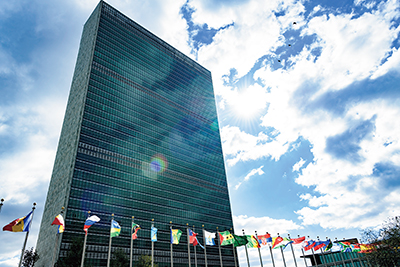 UN Headquarters (Photo: UN Photo/ Manuel Elias)
UN Headquarters (Photo: UN Photo/ Manuel Elias)In September, Prime Minister Abe and Foreign Minister Kono attended the 73rd session of the UN General Assembly.
Prime Minister Abe delivered a speech at the General Debate for six years in a row. In this speech, he declared Japan's resolve to focus on preserving and enhancing the free trade system, and clearing away the post-war structures in Northeast Asia. Furthermore, he asserted the importance of a “Free and Open Indo-Pacific,” and stated his conviction that the Japanese people would serve as powerful leaders with respect to the Sustainable Development Goals (SDGs), bearing in mind the international conferences to be held in Japan in 2019 (G20 and the Seventh Tokyo International Conference on Africa's Development (TICAD 7)).
In addition, Prime Minister Abe attended a high-level meeting entitled “A Call to Invest: Investing in Youth Jobs in Africa.” There, he touched on the fact that since the launch of TICAD in 1993, Japan has supported Africa's self-reliant development based on the principals of ownership (self-help efforts) on the part of African countries and partnerships (coordination) with the international community. In relation to the job creation of young Africans, he introduced Japan's initiatives related to promoting human resource development and private investment, including the ABE Initiative26, job training support, the Japan-Africa Public-Private Economic Forum27, and more. He went on to add that, Japan will continually invest for the future of Africa under public-private partnership with a view toward TICAD 7 to be held in Yokohama in August 2019.
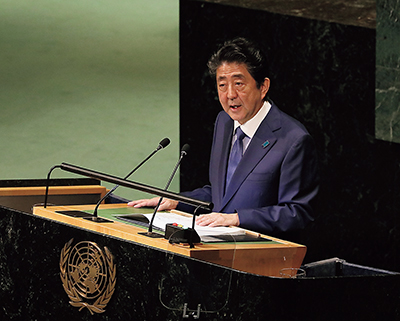 Prime Minister Abe attending the UN General Assembly (September 25, New York, U.S.; Photo: Cabinet Public Relations Office)
Prime Minister Abe attending the UN General Assembly (September 25, New York, U.S.; Photo: Cabinet Public Relations Office)On the margins of the UN General Asembly, Prime Minister Abe held Summit Meetings with UN Secretary-General Guterres, the U.S., Turkey, the ROK, and Iran and met with leaders of Panama and the UK to engage in lively exchanges of opinions over various challenges facing the international arena, such as the issue of North Korea, as well as bilateral relationships and more.
In the meeting with UN Secretary-General Guterres, the two reached a shared recognition concerning the importance of achieving UN reform, including the reform of the UN Security Council. In addition, they also affirmed the importance of having the international community continue to ensure the complete and total implementation of UN Security Council resolutions aimed at achieving the denuclearization of the Korean peninsula. In addition, Prime Minister Abe once again sought understanding and cooperation with respect to the early resolution of the abductions issue, to which UN Secretary-General Guterres expressed his support. Foreign Minister Kono either hosted or co-chaired the Sixth GUAM-Japan Ministerial Meeting (GUAM consists of Georgia, Ukraine, Azerbaijan, and Moldova), the Sixth Japan-CARICOM Ministerial-Level Conference, the Japan-Pacific Alliance Ministerial Meeting, the High-Level Side Event on Promoting Quality Infrastructure, the Ministerial Meeting of the Friends of the Comprehensive Nuclear-Test-Ban Treaty (CTBT), and the Ministerial Meeting on United Nations Relief and Works Agency for Palestine Refugees in the Near East (UNRWA). In addition, he also attended the Nelson Mandela Peace Summit, the Meeting of the Foreign Ministers of the G4 on United Nations Security Council Reform, and other meetings totaling 18 multilateral meetings. He also held 14 Foreign Minister's Meetings, including Japan-India and Japan-China, taking the opportunity of the UN General Assembly to strengthen mutual trust with his counterparts from other countries.
These examples show how Prime Minister Abe and Foreign Minister Kono took full advantage of the opportunity of the UN General Assembly, where important leaders gathered from around the world, to demonstrate Japan's leadership when it comes to resolving the various challenges confronting the international community. In addition, they also vigorously engaged in bilateral talks with leaders from different countries in aiming to strengthen bilateral relations, and assertively conveyed Japan's policies and positions to the international community.
In August, UN Secretary-General Guterres visited Japan for the second time after assuming office as the Secretary-General in January 2017, where he became the first UN Secretary-General to attend the Nagasaki Peace Memorial Ceremony at Peace Park. In the meeting with Prime Minister Abe held prior to this, the two held detailed exchange of view concerning North Korea, UN reform, disarmament and nonproliferation as well as global issues, and they concurred to continue to work closely together. Specifically, with regard to the issue of North Korea, the two reached a shared recognition regarding the need to adhere to the complete and total implementation by the international community of measures based on UNSC resolutions designed to elicit specific behaviors on the part of North Korea. As for disarmament and nonproliferation, Prime Minister Abe declared that Japan, as the only country to have ever suffered atomic bombings, would continue to act as an intermediary between those states with nuclear weapons and those without them in order to achieve a world free of nuclear weapons, and concurred with UN Secretary-General Guterres over continuing to cooperate with the UN on this issue. Moreover, Prime Minister Abe raised the urgent need to promote the reform of the UN Security Council in parallel with UN reform, and expressed his hope that UN Secretary-General Guterres would show strong initiative in this regard. Foreign Minister Kono held a breakfast meeting with UN Secretary-General Guterres in Nagasaki, where the two exchanged opinions over issues such as disarmament and nonproliferation, the issue of North Korea, and UN reform. In addition, UN Secretary-General Guterres met with survivors of the atomic bombing, and toured both the Nagasaki Atomic Bomb Museum and the Nagasaki National Peace Memorial Hall for the Atomic Bomb Victims.
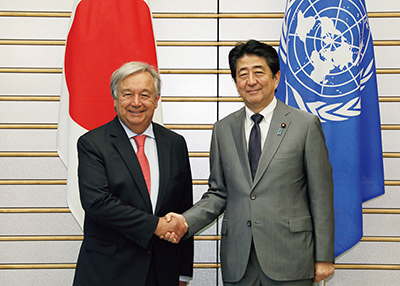 Prime Minister Abe shaking hands with UN Secretary-General Guterres (August 8, Tokyo; Photo: Cabinet Public Relations Office)
Prime Minister Abe shaking hands with UN Secretary-General Guterres (August 8, Tokyo; Photo: Cabinet Public Relations Office)Moreover, at the end of August, President of the 73rd session of the United Nations General Assembly Espinosa Garcés visited Japan right before assuming office of the president of the UN General Assembly in September, where she paid a courtesy call to Prime Minister Abe. She also exchanged a wide range of opinions with Foreign Minister Kono regarding UN Security Council reform, the North Korea situation, the SDGs, gender, and other challenges at the global level.
- 26 This aims to select young, outstanding African human resources who will serve as bearers for the future of business between Japan and Africa, offer them the opportunity to study abroad at Japanese universities and to intern at Japanese companies, and foster sophisticated industrial human resources who can serve as guides to Japanese companies entering African markets
- 27 Prime Minister Abe announced the launch of Japan-Africa Public-Private Economic Forum at the Sixth Tokyo International Conference on African Development (TICAD VI) in 2016. It is a forum where officials from the private and public sectors in Japan and Africa take part and exchange opinions with the goal of promoting cooperation between private companies in Japan and Africa and the business activities of Japanese companies in Africa.
(2) United Nations Security Council and its reform
A United Nations Security Council
The UN Security Council holds the primary responsibility within the UN for maintaining international peace and security. Its activities, including Peacekeeping Operations based on UN Security Council resolutions, are diversifying and the Council's role is expanding year by year, encompassing the efforts to address new threats such as the proliferation of weapons of mass destruction and terrorism.
Japan served as a non-permanent member of the UN Security Council for the 11th time from January 2016 to the end of December 2017, having served more frequently than any other UN Member State, and contributed proactively to discussions on topics such as country-specific situations and peacebuilding. During its term on the Council, which was its 11th such term, Japan made every effort to resolve North Korea's nuclear and missile issues; those efforts included contributions to drafting and the adoption of six UN Security Council resolutions in response to North Korea's repeated ballistic missile launches and three nuclear tests conducted in January and September 2016, and September 2017. At a UN Security Council Briefing on the denuclearization of North Korea held as part of High-level Week of the 73rd Session of the UN General Assembly, Japan led discussions related to maintaining international peace and security, such as by calling for solidarity among member nations with a view toward achieving the complete denuclearization of North Korea.
B Reform of the United Nations Security Council
For more than 70 years since the establishment of the UN, while the structure of the international community has changed significantly and despite the UN's functions having grown increasingly diverse in this day and age, the composition of the UN Security Council has basically remained unchanged still to this today. There is broad recognition of the necessity of promptly reforming the UN Security Council in a way that reflects the reality of the international community in order to improve its legitimacy, effectiveness, representativeness, and transparency.
Japan has contributed proactively to the international community in areas such as disarmament and non-proliferation, peacekeeping and peacebuilding, and “human security,” among others. To play an even more proactive role toward the realization of world peace and security through the UN, Japan has been making efforts to convince other countries in pursuit of the early realization of the UN Security Council reform, with the expansion of both permanent and non-permanent seats, and Japan's admission as a permanent member.
C Recent activities regarding the UN Security Council reform
Since 2009, in the UN General Assembly, Member States have been engaging in the Inter-governmental Negotiations on the UN Security Council reform. At the Inter-governmental Negotiations during the 72nd session of the General Assembly (held a total of five times from February to June 2018), the Co-chairs of the Intergovernmental Negotiations (UN Permanent Representatives of the United Arab Emirates and Georgia) worked to revise the document from the previous session based on the opinions of each country and group. The decision to pass on the existing documents, which include the document compiled at the 72nd session, to the 73rd session (from September 2018 to September 2019) was adopted with a consensus at the UN General Assembly in July 2018.
In addition, President of the UN General Assembly Espinosa Garcés reappointed the UN Permanent Representative from the United Arab Emirates to continue serving as a Co-Chair of the Inter-governmental Negotiations as a carryover from the 72nd session, while also appointing the UN Permanent Representative from Luxembourg to serve as a new Co-Chair of the Inter-governmental Negotiations. In addition, Japan also places great importance on strengthening its initiatives as a member of the G4 (Japan, India, Germany, and Brazil), a group that cooperates on promoting the UN Security Council reform. Foreign Minister Kono attended the Meeting of the Foreign Ministers of the G4 countries that was held along with the UN General Assembly High-level Week in September. At the Meeting, the Ministers agreed to enhance initiatives designed to launch text-based negotiations at the Inter-governmental Negotiations during the current session, and on this point, also to support moves to reflect the African shared position into the text-based negotiations. They also agreed to instruct those at the working level from each country to perform examinations related to future initiatives geared toward advancing reform of the UN Security Council.
Japan will continue to engage proactively in the process for realizing the UN Security Council reform, in close cooperation with reform-oriented countries.
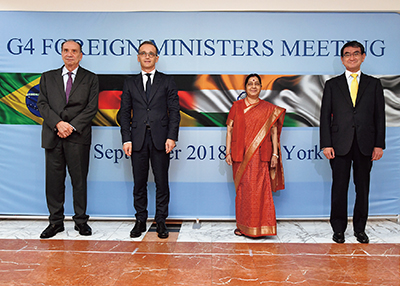 Meeting of the Foreign Ministers of the G4 countries (Brazil, Germany, India, and Japan) on the United Nations Security Council Reform (September 25, New York, U.S.)
Meeting of the Foreign Ministers of the G4 countries (Brazil, Germany, India, and Japan) on the United Nations Security Council Reform (September 25, New York, U.S.)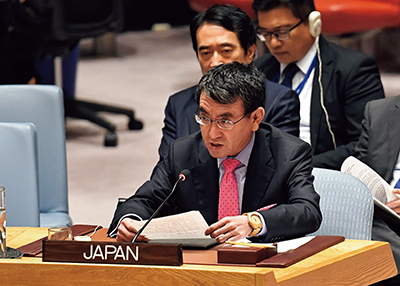 UN Security Council Ministerial-Level Meeting on the denuclearization of North Korea (September 27, New York, U.S.)
UN Security Council Ministerial-Level Meeting on the denuclearization of North Korea (September 27, New York, U.S.)(3) Administrative and Budgetary Issues of the United Nations
A Budget of the United Nations
The UN budget is mainly composed of the regular budget which is a biennial budget for the period from January to December of the next year, and the peacekeeping budget which is an annual budget for the period from July to the following June.
With regard to the regular budget, a revised budget for the biennium 2018-2019 amounting to approximately 5.8 billion US dollars was approved in December 2018 at the UN General Assembly (an increase of approximately 7.7% from the initial budget for the biennium 2018-2019). The budget for peacekeeping operations for the 2018-2019 period was approved in July 2018 (approximately 7.02 billion US dollars in total, a decrease of approximately 4% from the previous period).
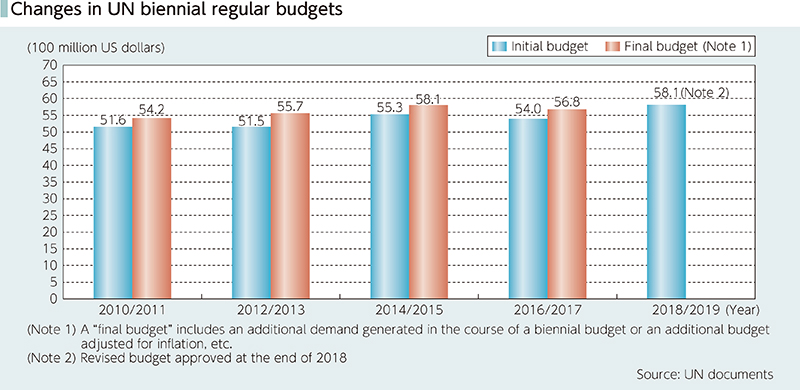
Furthermore, the scale of assessments, which is to be reviewed every three years, was negotiated in 2018. As the current methodology was maintained, Japan's scale of assessments for the period from 2019 to 2021 decreased to 8.564% (a 1.116-point decrease from the scale 9.680% for 2016-2018), which was the largest decrease among all Member States. In contrast, as China's scale rose substantially, Japan's scale of assessment for the regular budget became the third largest after the U.S. and China. As for the scale of assessment for the UN peacekeeping budget, Japan remained the third largest after the U.S. and China.
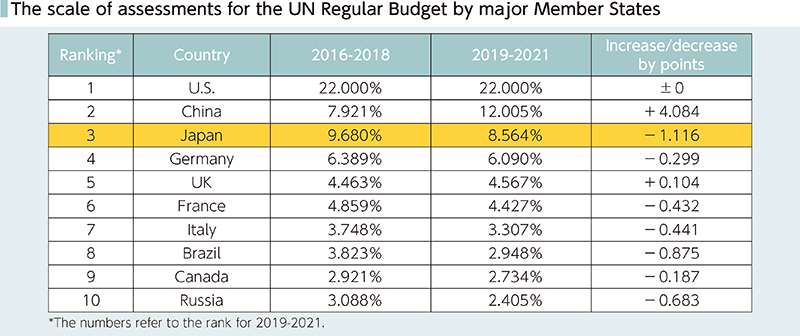
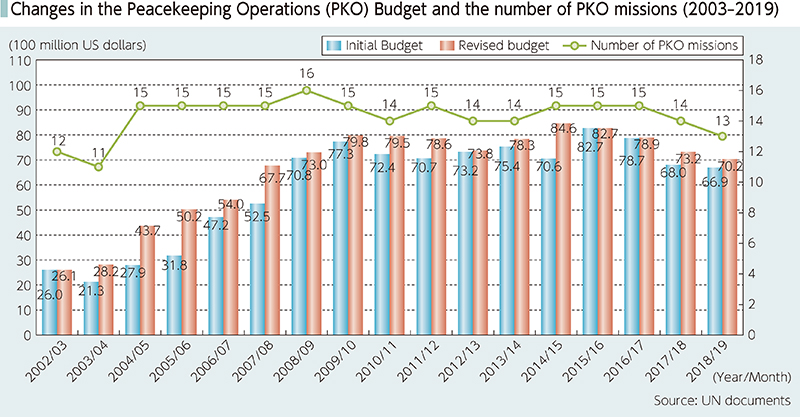
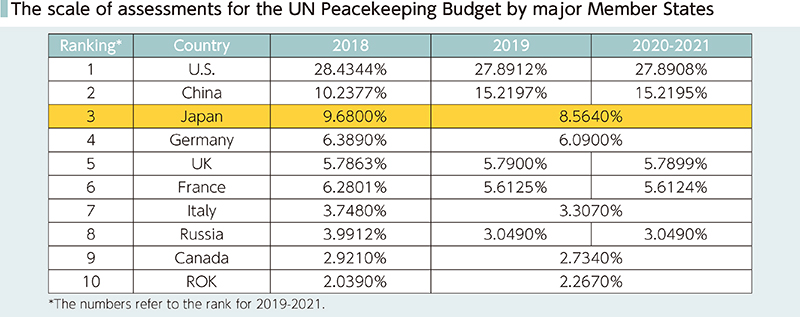
B Japan's Contribution
The UN budget, which supports the activities of the organization, is composed of assessed contributions duly paid by Member States and voluntary contributions paid in accordance with the policy need of Member States. With regard to the assessed contributions, Japan contributed approximately 235.3 million US dollars to the UN regular budget for 2018, ranking second after the U.S. Its contribution to peacekeeping operations for 2018 was approximately 478.78 million US dollars, coming third after the U.S. and China. As a major financial contributor, Japan has been encouraging the UN to make more efficient and effective use of its resources.
UN Secretary-General Guterres places priority on reforming the management of the UN (management and administration), along with addressing issues related to peace and development, and is engaged in efforts to further enhance the efficiency and effectiveness of the functions of the Secretariat. Japan, while supporting the objectives of reform, is urging the UN to advance its reform without additional financial burdens to Member States. Based on the General Assembly resolution adopted at the end of December 2017 on the policies for management reform, draft proposals on the organization and budget to implement reform were discussed in May 2018, and in January 2019 it was decided that a new organizational structure would be launched. It is expected that, under the new structure of the secretariat, the efficiency of the financial, budgetary, and human resource management of the UN will be strengthened.
